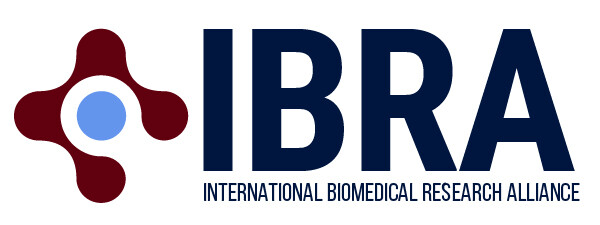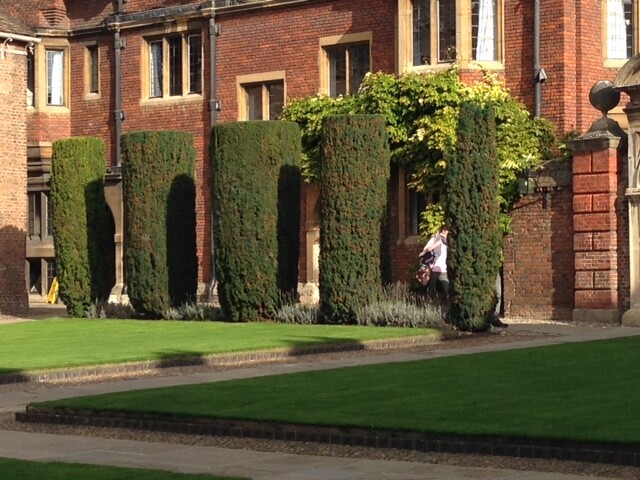
by biomed | Jun 20, 2015 | News
The NIH Oxford-Cambridge Scholars Program will hold the 2015 Annual Research Colloquium June 22-24th, 2015. This year the Colloquium will be hosted by the University of Cambridge at Downing College. In addition to a number of student presentations showcasing their extraordinary work, a stellar line-up of talks and workshops will be delivered by senior and leading academics including Publishing Science, Molecular Biology, Genetics, Big Data, Working in Industry, Clinical and Translational Immunology, and Protein Biosynthesis. Sponsors of this year’s Colloquium include WIRB-Copernicus Group (WCG), the world’s largest provider of regulatory and ethical review services and software to support clinical research, and Certara®, the global biosimulation technology-enabled drug development consultancy, and the International Biomedical Research Alliance.
Full agenda can be viewed here: NIH OxCam Cambridge Colloquium 2015 Schedule
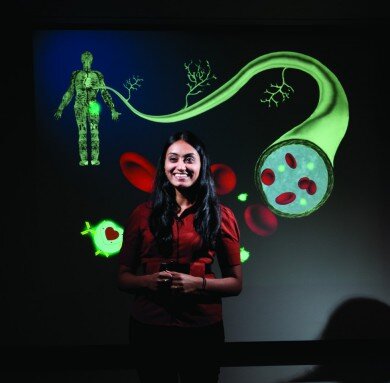
by biomed | May 23, 2015 | News
NIH Oxford-Cambridge Program Scholar Alumna, Dr. Ambika Bumb’s biotech company, Bikanta, has developed nanodiamond-based technology that assists in the early detection of cancer. Through the use of fluorescent nanodiamonds, medical imaging is enhanced, allowing cancer to be detected in deep tissue. Bikanta’s nanodiamonds are superior optical probes that emit a bright and stable signal, that is customizable (to target specific diseases) and nontoxic.
Ambika graduated from Georgia Tech and obtained her doctorate from Oxford while on the prestigious Marshall Scholarship. She completed two post-doctoral fellowships at the National Cancer Institute and National Heart, Lung and Blood Institute where she developed Bikanta’s nanodiamond-based technologies. She has received numerous scholarships and awards for excellence in engineering and was profiled in 2011 in Nature as a successful young scientist on the fast-track. Her work in the areas of nanomedicine and diagnostics has led to multiple patents and many publications.
You can read more about how Ambika founded Bikanta here:
http://www.femalefounderstories.com/ambika-bumb.html
You can read more about Bikanta’s nanodiamond technology here:
http://techcrunch.com/2014/08/07/bikantas-tiny-diamonds-find-cancer-before-it-spreads/

by biomed | Apr 30, 2015 | News
The International Biomedical Research Alliance is proud to congratulate a remarkable NIH Oxford-Cambridge Scholars Program graduate, Danielle Bassett (nee Perry), on her recent acceptance to the MacArthur Fellows Program. The MacArthur Fellows Program awards unrestricted fellowships to talented individuals who have shown extraordinary originality and dedication in their creative pursuits and a marked capacity for self-direction. The MacArthur Fellows Program is intended to encourage people of outstanding talent to pursue their own creative, intellectual, and professional inclinations. In keeping with this purpose, the Foundation’s “no strings attached” award is made directly to individuals rather than through institutions. Each fellowship comes with a stipend of $625,000 to the recipient, paid out over five years. Typically 20 to 30 Fellows are selected each year. In 1981 when the first class of fellows was named, the media coined the nickname “Genius Grant” to describe the fellowship.
Home-schooled from age 4 through high school, Dani received her B.S. (2004) from Pennsylvania State University and was a member of Penn State’s Schreyer Honors College. She received a Certificate of Postgraduate Study (2005) from the University of Cambridge through a Winston Churchill Scholarship and Ph.D. (2009) from the University of Cambridge through the Alliance supported NIH Oxford-Cambridge Scholars Program where her research in Meyer-Lindenberg’s NIMH lab focused on the human brain, particularly involving alterations in neural circuitry underlying psychiatric disease. At Cambridge, her mentors were Professor Thomas Duke (now deceased) in Physics and Professor Edward Bullmore in Experimental Psychology. She was a postdoctoral associate (2009–2011) and a Sage Junior Research Fellow (2011–2013) at the University of California, Santa Barbara, before joining the faculty of the University of Pennsylvania, where she is currently the Skirkanich Assistant Professor of Innovation in the Departments of Bioengineering and Electrical & Systems Engineering. She is considered is one of the foremost investigators of neural networks designed to understand how humans think.
It is important to note that Dani completed her Ph.D. in the NIH Oxford-Cambridge Scholars Program in just under the average time to completion rate of 4.0 years. When asked about Dani and the NIH Oxford-Cambridge Scholars Program, mentor Dr. Ed Bullmore noted that “The quality of the students in the NIH Oxford-Cambridge Scholars Program is truly outstanding. These are some of the smartest young people at the start of their careers in science and it is a privilege to work with them. But even by the exalted standards of this program, Dani Bassett was exceptional. She was remarkably productive, scientifically innovative and efficiently focused. She wrote some terrific papers herself in Cambridge and she was also a generous and effective collaborator and guide to other students in the lab. I was very proud but not very surprised when she won the MacArthur award. I think the NIH Oxford-Cambridge Scholars Program deserves a lot of credit for creating a unique opportunity for highly talented people like Dani to make a flying start to their lives in science and medicine.”
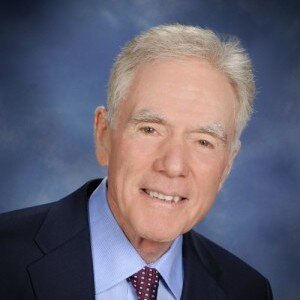
by biomed | Apr 7, 2015 | News
Dr. Ralph Snyderman, Chancellor Emeritus and James B. Duke Professor of Medicine at Duke University will be the inaugural speaker for the Lasker Lessons in Leadership to be held on the campus of the NIH on May 19, 2015. Dr. Snyderman’s talk entitled “From Brooklyn to Lab Bench to Board Room: Lessons Learned” will seek to provide sage advice to researchers at the beginning of their careers including the NIH-Lasker Research Scholars and NIH Oxford-Cambridge Scholars. More details to follow. For additional information regarding this event please email Randi Balletta at rb@biomedalliance.org.
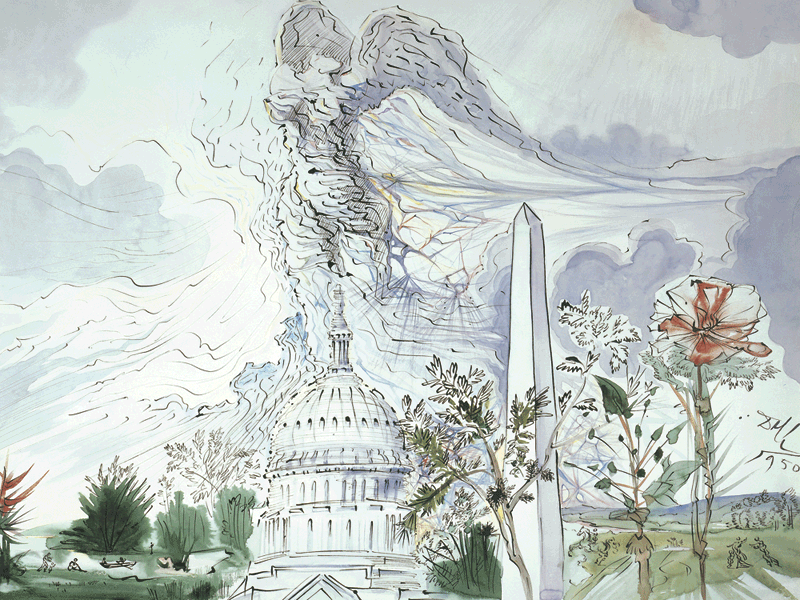
by biomed | Apr 7, 2015 | News
On April 9, 2015 members of the board of directors of the Albert and Mary Lasker Foundation, the International Biomedical Research Alliance and scholars and administrators of the NIH Oxford-Cambridge Scholars Program and MD/PhD Partnership Training Program, NIH-Lasker Research Scholars as well as distinguished guests attended the unveiling and rededication of Washington (Winged Victory – Washington) painted by Salvador Dali and commissioned by Mary Lasker in 1950. The signed lithograph was presented to the Mary W. Lasker Center for Health Research and Education shortly after its dedication in 1984. The painting expresses the notion of victory over death and disease. Mary and Albert Lasker believed that could be best achieved by using the tools of both basic and clinical science and they greatly supported the development of the National Institutes of Health. Scholars in the NIH Oxford-Cambridge Scholars Program took the lead in refurbishing the artwork and organizing details for the event in order to preserve this important piece of Lasker-NIH history.

